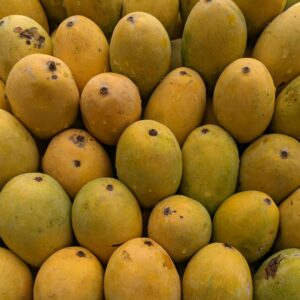Description
✅Pomegranate Specifications
-
Variety:
-
Common varieties: Ganesh, Bhagwa, Arakta, and Kandhari.
-
Type: Typically, they are classified into sweet, sour, and tangy varieties, with Ganesh and Bhagwa being the most popular for export.
-
-
Size:
-
Pomegranates are generally available in different sizes, typically ranging from 200 grams to 500 grams per fruit.
-
Size can be classified as:
-
Small: < 200 grams
-
Medium: 200 – 350 grams
-
Large: 350 – 500 grams
-
-
-
Color:
-
Outer Skin: Bright red to deep purple-red.
-
Inner Arils: Dark red, ruby-like appearance. The quality of the arils (seeds) and juice is an important factor in grading.
-
-
Shape:
-
Pomegranates are typically round, with a slightly flattened base.
-
Uniform, smooth skin is preferred in the international market.
-
-
Quality:
-
The fruit should be free from cracks, blemishes, and mold.
-
The rind should be thick and firm, without any soft spots, indicating over-ripeness.
-
The fruit should have high juice content and be heavy for its size.
-
-
Packaging:
-
Pomegranates are usually packed in cartons with a capacity of 10-15 kg.
-
Packing should include a protective layer, like foam or paper, to prevent damage during transport.
-
Export-grade packaging should meet international standards and regulations.
-
-
Shelf Life:
-
Pomegranates have a shelf life of about 2 to 3 weeks at room temperature.
-
Refrigeration can extend the shelf life to up to 4 weeks.
-
It is essential to maintain proper humidity and temperature conditions during shipping.
-
-
Storage Conditions:
-
The ideal storage temperature is between 5°C to 8°C (41°F – 46°F).
-
Relative humidity should be around 85% to prevent dehydration.
-
-
Nutritional Content:
-
Rich in antioxidants, Vitamin C, potassium, and fiber.
-
Known for their health benefits, including anti-inflammatory and heart-healthy properties.
-
-
Regulations and Certifications:
-
Ensure that the pomegranates meet the quality and safety standards of the importing country (e.g., Global GAP, HACCP).
-
Organic certifications may be required for certain markets.





Reviews
There are no reviews yet.